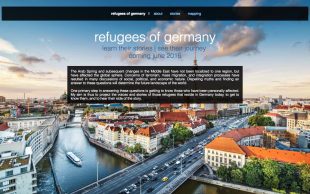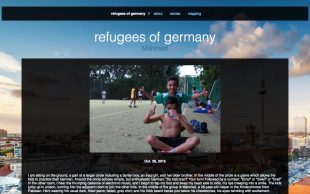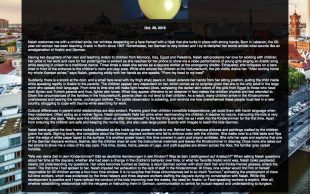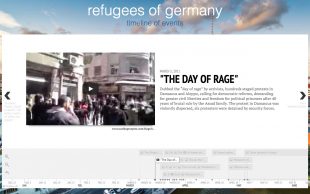The culmination of my time under the Mellon Digital Humanities Undergraduate Fellowship semester has been my website titled Refugees of Germany. This process has…
Given me space to design something from scratch (i.e. Ruby on Rails and Python). Not having studied computer science formally since high school, it has been incredibly formative to learn about the process of website design, and even get my feet wet in learning some code. In doing so, I was able to collaborate with friends in the computer science department who were extremely helpful in the structuring of the back end. I attribute my basic HTML and CSS familiarity and knowledge to a crash-course provided by Mackenzie and Brandon, and I was able to subsequently take advantage of
Codecademy, which I highly recommend to anyone trying to learn programming.
Allowed me to delve into the Syrian refugee crisis and better understand its history, magnitude, and implications. All of this was accomplished in the research that led to the creation of the digital timeline now featured on my website. Approaching my summer with this perspective is something that I can now reflect on as a crucial step in preparation for my time in Berlin.
Prepared a skeleton that will alleviate my work in Germany: I can wholly focus on conducting interviews, analyzing major themes, and representing these online. The weeks and months spent this semester have allowed me to accomplish the goal I set out for myself at the onset of the semester. I now have a container that I can fill with data I acquire this summer. The website can now serve as a platform for all of my research, and can be easily updated in real time!
Endowed me with respect for the power of images and storytelling via an online media. Reading and learning about the Syrian Civil War and the stories that accompany those who experienced it have had a profound impact on me. It has reinforced my motivation and endeavor to get to know those who have been personally affected by projecting their voices and stories, getting to know them better, and hearing their side of the story.
Humbled me with the recognition of the way the virtual can impact reality, and how we all can have an active part in telling history. Ultimately, what we experience through a website can fundamentally change how we behave and perceive reality. I believe that the information filtered through Western media has been incredibly one-sided and “self”-oriented. Hearing from both refugees and Germans on the ground and portraying those experiences on my website so that they are perceivable to all is a fascinating concept, and one that I believe to be increasingly important. We all have a role in telling our own history and understanding others’ histories as subjective truths.
Due to a technical glitch, the live site is no longer available. I have pasted below some screen shots including a brief glance at my summer’s work. Please feel free to contact me (carlm17@mail.wlu.edu) if you have any questions or would like to hear more!




